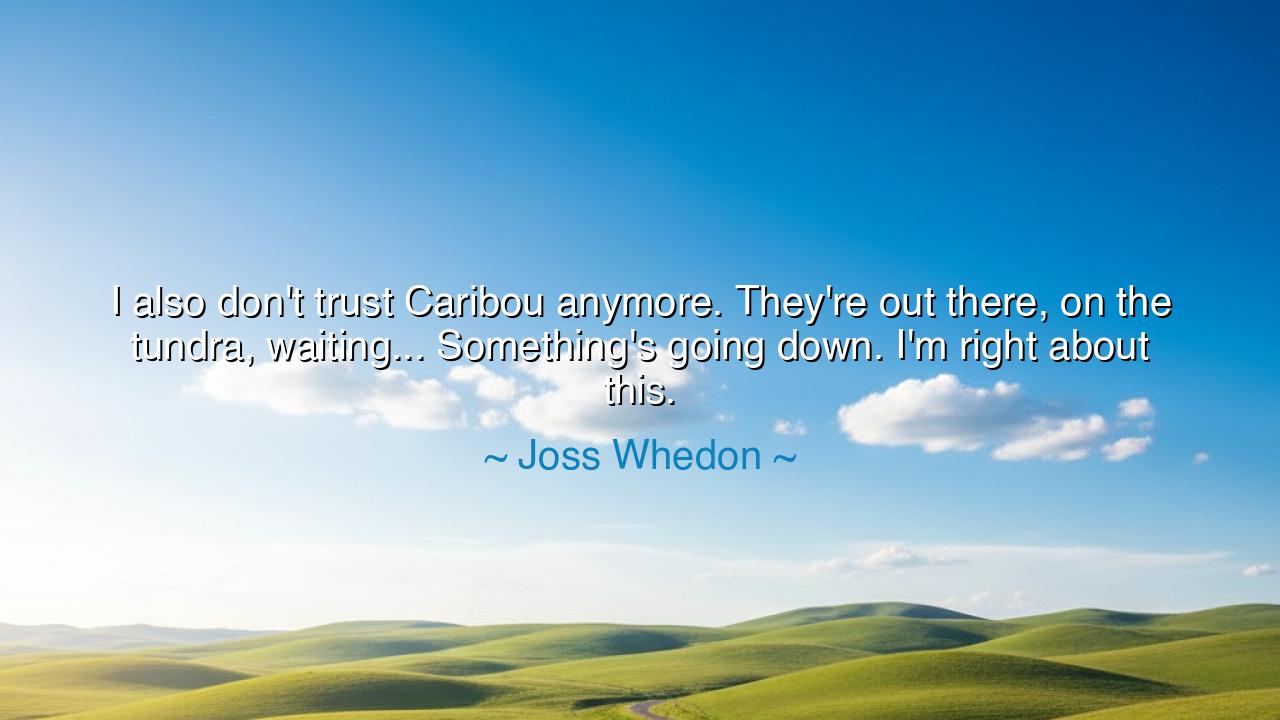
I also don't trust Caribou anymore. They're out there, on the
I also don't trust Caribou anymore. They're out there, on the tundra, waiting... Something's going down. I'm right about this.






Hear these strange and stirring words from Joss Whedon: “I also don’t trust Caribou anymore. They’re out there, on the tundra, waiting… Something’s going down. I’m right about this.” At first glance they appear playful, almost whimsical, the musings of a mind delighting in jest. Yet beneath the humor lies a deeper current of meaning. For even in jest the wise may speak truths, and even in folly the attentive ear may hear a warning. To say one does not trust the Caribou is to confess suspicion of what lies beyond our sight, to acknowledge the mystery of forces gathering on the horizon.
The tundra becomes, in this saying, the vast unknown that stretches before all humankind. In that silent whiteness, where beasts roam unseen and shadows move slowly but surely, the future prepares itself. The Caribou, harmless to the inattentive eye, become the symbols of hidden movements, of subtle changes that may one day crash upon the world like an avalanche. Thus, what sounds like humor is in truth an allegory: what we dismiss as harmless or trivial may in secret be preparing its power.
History has often shown that laughter can cloak prophecy. Recall how the court jester in medieval kingdoms would sometimes warn of dangers in playful riddles, and kings who ignored the jest often fell to the very perils foretold. So too here: Whedon’s playful suspicion of the Caribou reminds us not to ignore the small signs, the faint stirrings that herald great upheavals. For the fate of nations has been undone by forces once considered too insignificant to be feared.
Consider the tale of the Mongols. Once, to the lords of Europe, they were but distant riders on the steppes, strange and almost mythical, like animals upon a far tundra. Yet when the hour came, they thundered forth, swift as a storm, breaking kingdoms and remaking the world. To the inattentive, they had seemed far away, irrelevant, but those who watched closely could see: something was going down. The lesson is the same—dismiss nothing, for even the quietest presence upon the horizon may be preparing its time.
The words “I don’t trust them anymore” are the anthem of vigilance. Trust, once broken, should not be given lightly. Whether speaking of beasts or men, of nations or neighbors, one must discern carefully. The ancients knew this well: that betrayal often comes not from obvious enemies, but from those who seem ordinary, even harmless. The Caribou, standing in the snow, may represent complacency itself—what we allow to wander unexamined until it rises with power against us.
Yet the tone of this saying is not despair, but awakening. It bids us to be watchful, to cultivate an eye for hidden truths and concealed dangers. The waiting Caribou are the symbols of life’s unexpected trials—those challenges we do not anticipate, but which arrive all the same. To live wisely is to prepare the heart and sharpen the mind, not merely for the battles we already see, but for those forming silently at the edge of the horizon.
Therefore, the teaching is this: laugh, yes, but do not let laughter blind you. Be joyful, but also discerning. In your life, attend to the signs others overlook. When your instincts whisper that “something’s going down,” do not dismiss the warning. Test it, weigh it, and prepare. In small matters as in great, vigilance is the companion of wisdom. For though the Caribou may never descend from the tundra, the one who is ready for them will also be ready for all else that life may send.






Pphi
There’s something wonderfully surreal about this quote. It reads like a moment of comedic paranoia or even creative exaggeration. Still, it’s oddly effective in showing how fear can attach itself to anything — even to something as peaceful as caribou. Maybe Whedon is poking fun at our human tendency to turn the unknown into the suspicious. It’s humor, but it also reveals a subtle truth about irrational distrust.
NYNhi Nguyen Yen
This line is so random it borders on brilliant. It sounds like a mix between a joke and a mock prophecy. I love how it captures that dry, self-aware tone that makes you wonder if the speaker knows how ridiculous they sound. Maybe that’s the point — it highlights how conviction doesn’t always equal truth. Just because someone sounds confident doesn’t mean what they’re saying isn’t completely absurd.
NDNguyen Duc
I can’t help but laugh at this, but it also makes me think about how humor works as social critique. The exaggerated paranoia here feels like a metaphor for how people sometimes overreact to imagined threats. Could Whedon be playfully mocking human anxiety — our tendency to see patterns or conspiracies where none exist? It’s such a strange yet oddly relatable reflection of modern mistrust and overthinking.
GDGold D.dragon
This quote is hilarious and absurd in the best possible way. It feels like classic Joss Whedon humor — turning something completely innocent, like caribou, into a source of paranoia. I can’t tell if it’s meant as satire on conspiracy thinking or just random comic genius. Maybe it’s both? It makes me wonder if this line was spontaneous or part of a larger commentary on how easily humans project suspicion onto harmless things.